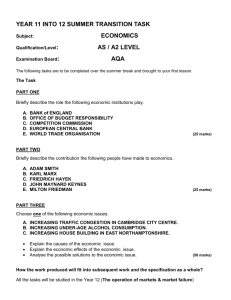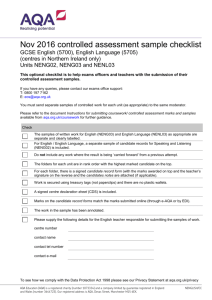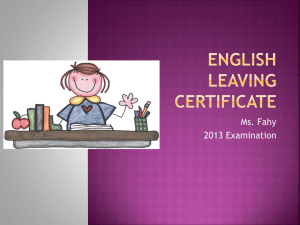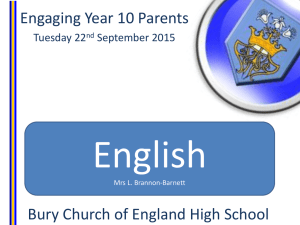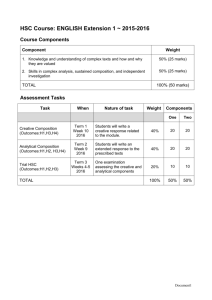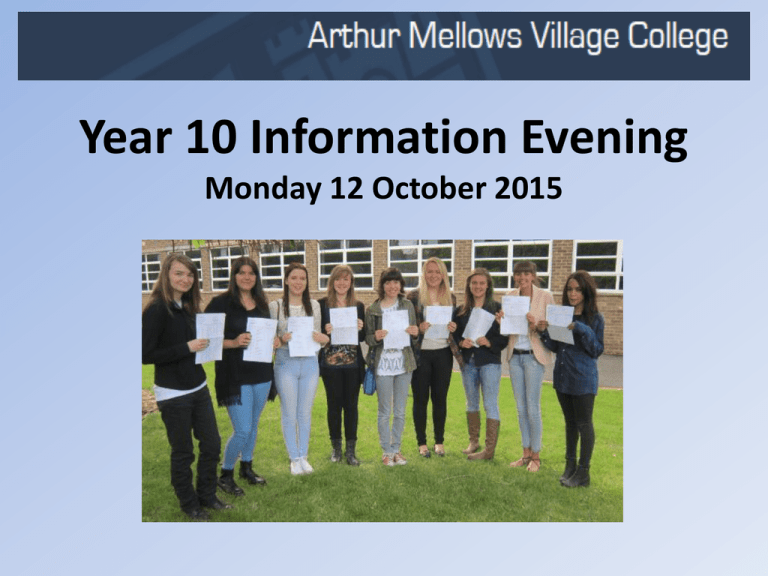
Year 10 Information Evening
Monday 12 October 2015
Programme for the Evening
• Welcome and information on Work
Experience by M Warrington, Head of Year 10
• 6.40 pm - Maths Department presentation
• 6.50 pm – English Department presentation
• 7.05 pm – Science Department presentations
ARTHUR MELLOWS VILLAGE COLLEGE
WORK EXPERIENCE
Monday 11 July 2016
to
Friday 22 July 2016
WORK EXPERIENCE
TIMELINE
• All choices will be made in Lifeskills
lesson by: Monday, 9 November 2015
• Access available from home
https://pss.learnaboutwork.net
• System locked down
Friday 13 November 2015
• Completed forms returned to school by
Friday 4 December 2015
WORK EXPERIENCE
INSTRUCTIONS
• Website instructions, access codes
and application forms available
from Mrs Crick
• Mrs Crick 01733 252235 Ext 302
• jcrick@arthurmellows.org
Maths
GCSE MATHEMATICS
Two tiers of entry
• Higher Level (Grades 9 to 4)
• Foundation Level (Grades 5 to 1)
Assessment
• Assessed by 100% examination
• Examinations completed at the end of year 11.
• There are three examinations each paper is
out of 80 marks.
– 1 non calculator
– 2 calculator
• There is no coursework.
Subject Content
Topic Area
Number
Algebra
Ratio
Geometry
Probability and statistics
(combined)
Foundation
Tier (%)
25
20
25
15
15
Higher
Tier (%)
15
30
20
20
15
ASSESSMENT OBJECTIVES
A01: Use and apply standard techniques
Students should be able to:
• accurately recall facts, terminology and
definitions
• use and interpret notation correctly
• accurately carry out routine procedures or
set tasks requiring multi-step solutions.
Assessment objectives
A02: Reason, interpret and communicate
mathematically
Students should be able to:
• make deductions, inferences and draw
conclusions from mathematical information
• construct chains of reasoning to achieve a given
result
• interpret and communicate information accurately
• present arguments and proofs
• assess the validity of an argument and critically
evaluate a given way of presenting information.
Assessment Objectives
A03: Solve problems within mathematics
and in other contexts
Students should be able to:
• Translate problems in mathematical or nonmathematical contexts into a process or a series of
mathematical processes
• make and use connections between different parts
of mathematics
• interpret results in the context of given problem
• evaluate methods used and results obtained
• evaluate solutions to identify how they may have
been affected by assumptions made.
Grade descriptors
To achieve grade 2, candidates will be able to:
• recall and use notation, terminology, facts and
definitions; perform routine procedures, including
some multi-step procedures
• interpret and communicate basic information; make
deductions and use reasoning to obtain results
• solve problems by translating simple mathematical
and non-mathematical problems into mathematical
processes
• provide basic evaluation of methods or results
• interpret results in the context of the given problem.
Grade descriptors
To achieve grade 5, candidates will be able to:
• perform routine single - and multi-step procedures
effectively by recalling, applying and interpreting notation,
terminology, facts, definitions and formulae
• interpret and communicate information effectively
• make deductions, inferences and draw conclusions
• construct chains of reasoning, including arguments
• generate strategies to solve mathematical and nonmathematical problems by translating them into
mathematical processes, realising connections between
different parts of mathematics
• interpret results in the context of the given problem
• evaluate methods and results.
Grade descriptors
To achieve grade 8, candidates will be able to:
•
•
•
•
•
•
•
•
Perform procedures accurately
Interpret and communicate complex information accurately
Make deductions and inferences and draw conclusions
Construct substantial chains of reasoning, including
convincing arguments and formal proofs
Generate efficient strategies to solve complex
mathematical and non-mathematical problems by
translating them into a series of mathematical processes
Make and use connections, which may not be immediately
obvious, between different parts of mathematics
Interpret results in the context of given problem
Critically evaluate methods, arguments, results and the
assumptions made.
HOMEWORK
• Homework is set once a week
• Most homework will be set using the College
portal
• Homework is vitally important as it helps to
practise the skills that will be assessed in the
examinations
• Homework allows misconceptions to be
picked up and dealt with before the exams.
RESOURCES
•
•
•
•
•
Mathswatch
Revision guides
Workbooks
Useful websites for revision (see handout)
Functional skills question of the fortnight.
WHAT YOU CAN DO!
• Ensure students are completing homework
tasks with clear working out
• Make sure students have the correct
equipment for lessons including a calculator
(see handout)
• Help to focus students but also keep them
calm about exams
• Ensure students revise for all examinations.
WHAT YOU CAN DO!
• Encourage students to complete, and submit,
the ‘Functional Skills question of the
Fortnight’
• Test their knowledge/memory of key formulae
• Encourage students to use their maths skills in
practical situations at home or when out. (see
handout)
• Arithmetic skills (30 sec./1 minute tests in
newspapers).
Try one yourself ..........
What is?
84
÷7
TIMES BY ITSELF
+6
HALF OF IT
+9
÷ 12
x 30
- 111
÷ 9
Year 10 English Language and
Literature
A Brave New World!
AQA English Language and
Literature
•
•
•
•
•
•
•
•
Still TWO separate qualifications
No tiered entry
100% terminal examination
Speaking and Listening still assessed – Spoken
Language
Literature – all closed book examinations
Language – Two papers
Literature – Two papers
1-9 grading system
English Language Paper 1 – 1 hr 45 mins
• Reading – Four questions on one single text, 20th or
21st Century Literary Fiction.
• Texts could be extracts from novels and short stories
• Could focus on: openings, endings, narrative
perspectives and points of view, narrative or
descriptive passages, character developments,
atmospheric descriptions and other appropriate
narrative and descriptive approaches.
• Writing – descriptive/narrative writing – using either
an image or title.
Paper 1 Section A: Sample question 2
Look in detail at this extract from lines 8-17 of the source.
The wind came in gusts, at times shaking the coach…
How does the writer use language here to describe the
effects of the weather?
You could include the writer’s choice of:
• words and phrases
• language features and techniques
• sentence forms.
[8 marks]
Slide 22
Copyright © AQA and its licensors. All rights reserved.
Paper 1 Section A: Sample question 4
Focus this part of your answer on the second half of the
source, from line 18 to the end.
A student, having read this section of the text said: “The
writer brings the very different characters to life for the
reader. It is as if you are inside the coach with them.”
To what extent do you agree?
In your response, you could:
• write about your own impressions of the characters
• evaluate how the writer has created these impressions
• support your opinions with quotations from the text.
[20 marks]
Slide 24
Copyright © AQA and its licensors. All rights reserved.
Paper 1 Section B: Sample question 5
You are going to enter a creative writing competition. Your
entry will be judged by a panel of people of your own age.
Either: Write a description suggested by this picture:
Or: Write the opening part of a story about a place that is
severely affected by the weather.
[24 marks for content and organisation
16 marks for technical accuracy]
Slide 30
Copyright © AQA and its licensors. All rights reserved.
English Language Paper 2
• Reading – Questions on two texts. One Non-fiction text and
one Literary Non-fiction text.
• Sources will be drawn from the 19th century, and either the
20th or 21st centuries
• Focus on how writers have particular viewpoints and
perspectives on issues or themes that are important to the
way we think and live our lives.
• Texts such as high quality journalism, articles, reports, essays,
travel writing, accounts, sketches, letters, diaries, reports,
autobiography and biographical passages or other appropriate
non-fiction and literary non-fiction forms.
• Writing – writing to present a viewpoint. produce a written
text to a specified audience, purpose and form in which they
give their own perspective on the theme that has been
introduced to them in section A.
Paper 2 Section B: Sample question 5
‘Homework
has no value. Some students get it done for
them; some don’t do it at all. Students should be relaxing
in their free time.’
Write an article for a broadsheet newspaper in which
you explain your point of view on this statement.
(24 marks for content and organisation
16 marks for accuracy)
[40 Marks]
Slide 46
Copyright © AQA and its licensors. All rights reserved.
Spoken Language – assessed
separately
Non-examination Assessment: Spoken Language
What’s assessed
(AO7-A09)
• presenting
• responding to questions and feedback
• use of Standard English
Assessed
• teacher set throughout the course
• marked by teacher
• separate endorsement (0% weighting of GCSE)
Assessment Objectives
Paper
1
Q1
AO1
List 4 things…
Identify explicit
information
Q2
AO2
Q3
Q4
AO2
AO4
Paper
2
AO1
How does the
structure…
To what extent do
you agree?
Descriptive or
narrative writing
Comment, explain,
analyse
Comment, explain,
analyse
Evaluate texts critically
8 marks
8 marks
20 marks
Communicate clearly
Organise information
Use a range of vocab
and sentence
structure
Accurate spelling and
punctuation
AO1
True/false statements…
Write a summary…
Explicit and implicit ideas
and information
synthesis of explicit
and implicit ideas
and information
AO5/AO6
AO2
How does the
writer’s use of
language…
Comment, explain,
analyse
4 marks
AO5/AO6
How does the writer’s
use of language…
Identify explicit
ideas
4 marks
Q5: Writing
8 marks
AO3
How the writers
present…
Compare writers’
ideas and
perspectives, and how
they are conveyed
16 marks
12 marks
Slide 34
Students write
about their own
views
Communicate clearly
Organise information
Use a range of vocab
and sentence
structure
Accurate spelling and
punctuation
Copyright © AQA and its licensors. All rights reserved.
English Literature
Literature Paper 1 - 1hr 45 mins
• Shakespeare – Two parts: one question on an extract from the
play plus one other on the whole play
• Pre 19th Century Novel – Two parts: one question about an
extract then another response on the whole novel
Paper 1 Section A: Shakespeare sample
question
Focus on the printed extract
enables candidates to address
AO1 and AO2 with close reference
to text, before widening the scope
of their response to the play as a
whole.
Addressing AO1 by asking for a
‘response’ to an idea, or statement, about
an aspect of the play.
Starting with this speech, explain how far you think
Shakespeare presents Lady Macbeth as a powerful woman.
Focus on Shakespeare as writer in order
to remind candidates to think about the
text as a conscious construct and thereby
address AO2.
Write about:
•
•
Slide 23
This asks students to think about
contextual elements (AO3): in this case
the idea of ‘power’ as well as ideas
about women within this context.
how Shakespeare presents Lady Macbeth in this speech
how Shakespeare presents Lady Macbeth in the play as a whole.
Copyright © AQA and its licensors. All rights reserved.
Paper 1 Section B: 19th century novel sample
question
Focus on Dickens as writer in
Focus on the printed extract enables
candidates to address AO1 and AO2 with
close reference to text, before widening the
scope of their response to the novel as a
whole.
order to remind candidates to
think about the text as a
conscious construct and
thereby address AO2.
Starting with this extract, how does Dickens present Scrooge
as an outsider to society?
Instruction to look at the bullets, which
reiterate and remind students to focus
on both the extract and the novel as a
whole.
This asks students to think
about contextual elements
(AO3): in this case societal
elements.
Write about:
• how Dickens presents Scrooge in this extract
• how Dickens presents Scrooge as an outsider to society in the novel as a whole.
Slide 29
Copyright © AQA and its licensors. All rights reserved.
Literature Paper 2 – 2 hr 15 mins
• Modern texts – one essay question from a choice of two.
• Poetry – comparing a printed poem with one from their
Anthology.
• Unseen Poetry – one question on one unseen poem printed
plus a comparison with another unseen printed poem.
Studied poetry clusters
Anthologies will be provided for students by AQA:
Love and relationships
Lord Byron
Percy Bysshe Shelley
Robert Browning
Elizabeth Barrett Browning
Thomas Hardy
Maura Dooley
Charlotte Mew
C Day Lewis
Charles Causley
Seamus Heaney
Simon Armitage
Carol Ann Duffy
Owen Sheers
Daljit Nagra
Andrew Waterhouse
When We Two Parted
Love’s Philosophy
Porphyria’s Lover
Sonnet XXIV - I Think of thee
Neutral Tones
Letters from Yorkshire
The Farmer’s Bride
Walking Away
Eden Rock
Follower
Mother, any distance
Before You Were Mine
Winter Swans
Singh Song!
Climbing My Grandfather
Slide 44
Copyright © AQA and its licensors. All rights reserved.
Paper 2 Section C: unseen poetry sample
question
Focus on single
poem.
Focus on writer in order to remind
candidates to think about the texts as a
conscious construct and thereby
address AO2.
27.1
In ‘To a Daughter Leaving Home’, how does the poet
present the speaker’s feelings about her daughter?
[24 marks]
Slide 55
Copyright © AQA and its licensors. All rights reserved.
Paper 2 Section C: unseen poetry sample
question
Question outlines focus for
comparison.
27.2
In both ‘Poem for My Sister’ and ‘To a Daughter Leaving Home’
the speakers describe feelings about watching someone they
love grow up. What are the similarities and/or differences
between the ways the ways the poets present these feelings?
[8 marks]
Focus on methods to
highlight AO2.
Slide 56
Further scaffolding to
support comparison.
Copyright © AQA and its licensors. All rights reserved.
Common Worries
• We have to memorize texts and quotations from scratch.
• You can make references to texts, paraphrase or quote.
• The bigger essay questions reward equal marks for the extract
analysis tasks which are printed for students.
• The Poetry Paper is really hard.
• The unseen poetry questions are traditionally the best responses
students give!
• Can’t take texts in.
• Actually students waste valuable time looking for quotes in texts or
copying our their notes rather than answering the essay questions.
• How do we approach the Language Revision?
• Each question assesses a different objective – so we can learn what
to write for each.
How can you help?
• We use class texts but students may prefer to buy their
own copies to annotate.
• Encourage students to read Non-Fiction. Newspapers
(The Guardian) and quality magazines.
• They will know which question assesses which skills so
can practise on any fiction/non-fiction articles.
• Websites – BBC Bitesize, AQA Resources – e Library
• Set Text Study Guides – any publication.
• Wider reading of texts by the same author/poet/genre.
• Encourage creative or non fiction writing – help to
proof read and develop stronger accuracy/expression.
Ways Forward
Whatever our views as teachers and parents
regarding the new changes:
• We will adapt and meet the demands of the
new courses.
• We will work hard to make sure our students
achieve their potential.
SCIENCE DEPARTMENT
PRESENTATIONS
• Triple Science -
remain in the Main Hall
• Core Science -
Sixth Form Café/R6
GCSE SCIENCE AT AMVC
COURSE DETAILS – TRIPLE SCIENCE
• Exam board – OCR
• Specification- 21st Century
Science
• Year 10/11 GCSE Courses
–Biology
–Chemistry
–Physics
Key details:
–Linear course (no module
exams)
–Terminal exams in June 2017
–Grades A*-G
RE-SITS
• None allowed.
YEAR 11 EXAMINATIONS
• 3 exams per subject taken (total of 9
exams), each worth 25% (more later)
YEAR 11 EXAMINATIONS
• More questions now require detailed written
answers
YEAR 11 EXAMINATIONS
• More Maths content
(c) Doctors estimate that between 1 in 10 000 and 1 in 12 000
babies born in the UK has PKU
The Office for National Statistics reported that 710 000
babies were born in the UK in 2008.
(i) Estimate the lower and upper limits for the number of
babies born in the UK in 2008 that you would expect to have
PKU
from ……………….. To…………….. [1]
YEAR 11 EXAMINATIONS
(iii)Testing a baby for PKU costs the NHS £6.
Estimate the upper and lower limits of the cost
to the NHS of identifying one baby with PKU
from £……………….. to…………….. [1]
COURSEWORK
• Now controlled assessments- worth 25%
• Completed by Triple Science students at
the end of Year 10/ start of Year 11.
• Involves a practical investigation for each
subject (see handout for details).
YEAR 11
Autumn
2016
Biology25%
• Controlled AssessmentPractical Investigation
Classroom
based
Chemistry25%
• Controlled AssessmentPractical Investigation
Classroom
based
Physics25%
• Controlled AssessmentPractical Investigation
Classroom
based
June
2017
Exams
Biology25%
Chemistry25%
• B1 Genetics
• B2 Keeping Healthy
• B3 Life on Earth
• C1 Air Quality
• C2 Material Choices
• C3 Chemicals in our Lives
Unit 1- Biology
1 hour
Unit 1Chemistry
1 hour
Physics25%
• P1 The earth & the Universe
• P2 Radiation & Life
• P3 Sustainable Energy
Unit 1- Physics
1 hour
June
2017
Exams
Biology25%
Chemistry25%
Physics25%
• B4 The Processes of Life
• B5 Growth and Development
• B6 Brain and Mind
• C4 Chemical Patterns
• C5 Chemicals of the Natural
Environment
• C6 Chemical Synthesis
• P4 Explaining Motion
• P5 Electrical Circuits
• P6 Radioactive Materials
Unit 2- Biology
1 hour
Unit 2Chemistry
1 hour
Unit 2- Physics
1 hour
YEAR 11
Biology25%
June
2017
Exams
• B7 Further Biology
Unit 3Biology
1 hour
Chemistry25%
• C7 Further Chemistry
Physics25%
• P7 Further Physics
Unit 3Chemistry
1 hour
Unit 3Physics
1 hour
TESTS/MOCK
EXAMINATIONS
• Classroom tests carried out at the end of each
module (eg B1 or C1 etc.)
• Mock exams at the end of each unit (eg B1, B2 and
B3)- one in January 2016 and one in June 2016 (total
of six).
• Second set of two mock exams per subject in
December 2016 (total of six)
• Allows for effective monitoring of student progress
and intervention if needed to support.
WHAT CAN YOU DO TO HELP?
• Be positive about their science work
• Encourage them to read any newspaper/
magazine articles on science.
• Encourage them to watch any programmes on
television about science.
• Help them organise work for controlled
assessment
..CONTINUED
• Practise Physics formulae with them and make sure
they understand how to use them.
• Practise writing out chemical equations.
• Help with revision before their module tests and unit
exams
• Buy the revision guide and encourage them to use it!
• Encourage use of revision websites (see handout)
• Come and speak to us if help is needed.

